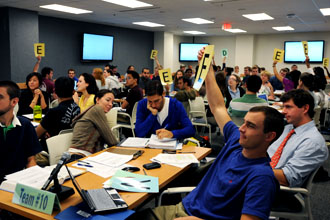Medical Students Experience Team Learning
The DeBakey Educational Center is a place where active team-based learning takes place in Tulane School of Medicine first- and second-year classes. The center, located in the Murphy Building on the downtown health sciences campus, is filled with tables for seating six students each, and the walls feature 15 65-inch LCD flat-screens and two large smart boards.

The DeBakey Educational Center offers first- and second-year medical students an environment for effective team-based learning, using tools that range from 65-inch LCD flat-screens to flash cards. (Photo by Sally Asher)
The facility's mission is to "use technology and architecture to drive educational change," says Dr. Kevin Krane, professor of medicine and vice dean of academic affairs at the medical school. "Creating a facility like this lets us pull off things educationally that we didn't even think of two years ago. The learning is really significant."
The goal, Krane says, is to get the students to learn the material either on their own or in teams and then use class time to assess what they've learned.
The center is named in memory of the late Dr. Michael DeBakey, a heart surgeon pioneer who graduated from the Tulane School of Medicine in 1932. "It reminds students of the giants of medicine who have come from this institution," Krane says.
Assignments to six-person table groups are made with an eye to the diversity of the students' backgrounds and undergraduate degrees. When they first enter the DeBakey classroom, whether for a two-hour session for the first-year Foundations of Medicine course or a second-year Mechanisms of Disease class, students take an individual quiz on the assigned readings. Next, each group discusses their quiz responses and they try to reach agreement on the best answers to each question.
The groups then turn to exploring a complex series of case studies, most of which have no clearly correct answers. Spirited table talk ensues, with some participants checking Internet resources. They may even call a "lifeline."
"These students are learning important skills that will make them better physicians," says Krane, his eyes scanning the 25 or so tables in the room. "And everybody's awake."
